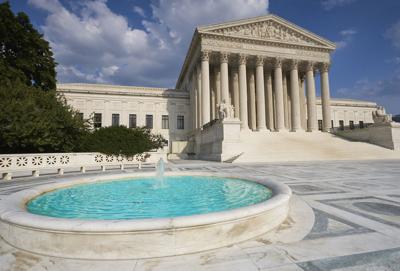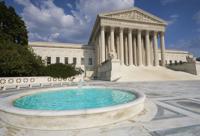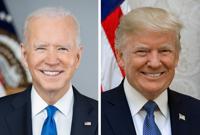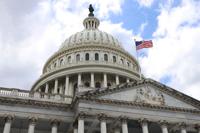Today (June 30) marks the 60th anniversary of a landmark U.S. Supreme Court decision that formally recognized the freedom of association and the right to donate anonymously to non-profit groups as a constitutional right protected by the First Amendment.
In NAACP v. Alabama, a significant win for the civil rights movement, the Supreme Court overturned an Alabama court ruling that had restrained the National Association for the Advancement of Colored People (NAACP) from operating in the state. The ruling ensured that NAACP members could donate without fear of retaliation, an essential principle that nonprofits argue must still be protected.
“Everyone has the right to educate others and promote a position on political and social controversies,” the Phoenix-based think tank, the Goldwater Institute, says. “And no one should fear retaliation, or have to give up their right to privacy, simply because they choose to support a group that speaks about public controversies.”
Local and state governments, however, are increasingly passing laws that are weakening donors' rights to privacy, nonprofits attest, especially when these groups support or oppose political candidates or produce educational material about various public issues.
“A recent string of campaign-finance cases involving groups that support or oppose candidates for office has weakened protections for donors’ right to remain anonymous,” the Institute says. “And the reasoning of those cases has been used by lower federal courts to undermine anonymity in a very different context – non-profit speech that educates the public about significant issues, such as ballot initiatives.”
Cities and states throughout the U.S. are advancing laws that require non-profits to disclose their donors' identities. Santa Fe, New Mexico and Denver, for example, recently adopted laws that require non-profits to disclose their donor information any time they spend $250 to communicate to the public about an issue on the ballot.
In Colorado, the Institute for Free Speech (IFS) won a lawsuit against the state, raising the required disclosure amount.
In Tempe, Arizona, 91 percent of voters this March approved an amendment to the city's charter that requires nonprofits that spend more than $1,000 on local elections to disclose the identity of their donors. Within a few weeks, the Arizona Legislature passed a bill blocking local governments from imposing such a rule.
Gov. Doug Ducey signed the bill into law on April 5. He argued that people should not be intimidated to participate in the political process.
“People have a First Amendment right as well to participate and not be bullied,” Ducey said.
Both Montana and New Mexico legislatures enacted laws requiring non-profit donor disclosure, and the most egregious laws infringing on donor privacy have been passed in New York and California, David Keating, President of IFS, told Watchdog.org.
There has always been, and always will be a conflict between the public’s “right to know” about who donates to non-profit groups that are advocating about various issues and maintaining the privacy of these advocates. State governments have reasoned that requiring donor information is necessary to enforce the law.
Lawrence Noble, former general counsel for the Federal Election Commission, holds this view. At a recent CATO forum commemorating the 60th anniversary of the NAACP case, he argued that reviewing donor reports was essential to assess whether and how campaign finance laws were violated.
But IFS maintains that this reasoning “does not hold up to scrutiny.” It points to the case, Americans for Prosperity Foundation v. Becerra, in which the judge found that the California Attorney General “was hard pressed to find a single witness who could corroborate the necessity of Schedule B forms [the form containing donor information] in conjunction with their office’s investigations.”
IFS is currently in the process of challenging the state of California in court over its demand for IFS donor information. IFS’s case was not granted cert to the Supreme Court, but it is now being reviewed by the Ninth Circuit Court of Appeals on a different question, which could warrant being heard by the Supreme Court.
Another reason for disclosure, Noble argues, relates to his previous role as the director of the Center for Responsive Politics, which runs OpenSecrets.org to publicize campaign finance information. He argues that having access to information about the government is a First Amendment right. Citizens have a “basic right to information about your government. How can you be a responsible citizen and voter if you’re not told who is funding elections; if you’re not told who is behind policies,” Noble said.
Keating disputed Noble's argument, telling Watchdog.org that “it’s not a basic right. There’s nothing in the U.S. Constitution that says you have the right to know what someone else is doing.”
IFS also argues that there should be much higher thresholds for donor disclosures and that Congress should adjust the disclosure law that has not been changed since 1979.
One way of encouraging citizens to participate in the political process, Keating argues, is to have some assurance that their privacy will be protected. People who don’t or can’t donate may volunteer their time.
Keating asks, “Should we require that nonprofits disclose a list of all of their volunteers?”
Matt Miller, senior attorney at the Goldwater Institute, told Watchdog.org that there is an organized effort by several groups to push disclosure laws in cities throughout America.
“It’s unclear whether cities actually care about this information, or simply see the threat of disclosure as a way to silence non-profit groups," he said. "These laws can be overturned under NAACP v Alabama. That is what we’re trying to do with our cases against Santa Fe and Denver.”
Miller said it’s important to note that these laws apply to speech about ballot measures.
"That’s different than speech about candidates," he said. "Courts have said, in the candidate context, that the government can regulate campaign finance because of the possibility of quid pro quo corruption. That rationale cannot apply to speech about ballot measures. When you talk about a ballot measure, that’s just pure speech. And courts have been clear that you have a right to speak anonymously.”
Disclosing donor information presents real dangers, nonprofits argue. In 2012, the IRS illegally leaked the National Organization of Marriage’s donor information, which led to many of its donors being harassed and cyber-bullied. In an era of instant internet access, Twitter and Facebook trolling and censorship, online bullying, and a highly polarized political climate, privacy has become more of a safety issue.
IFS staff stressed the difference between privacy and transparency to Watchdog.org.
“Transparency is an important value – when applied to government. Citizens, however, have a right to privacy. Not the other way around.”
“The split in federal circuits about the ballot-initiative question is too deep for the Supreme Court to ignore forever,” the Goldwater Institute adds. It, IFS, and many other nonprofits warn that the issue will end up in the Supreme Court again.
When it does, they point to the court’s reasoning in NAACP v. Alabama as the “touchstone for deciding whether the First Amendment protects donor privacy in the modern era.”











